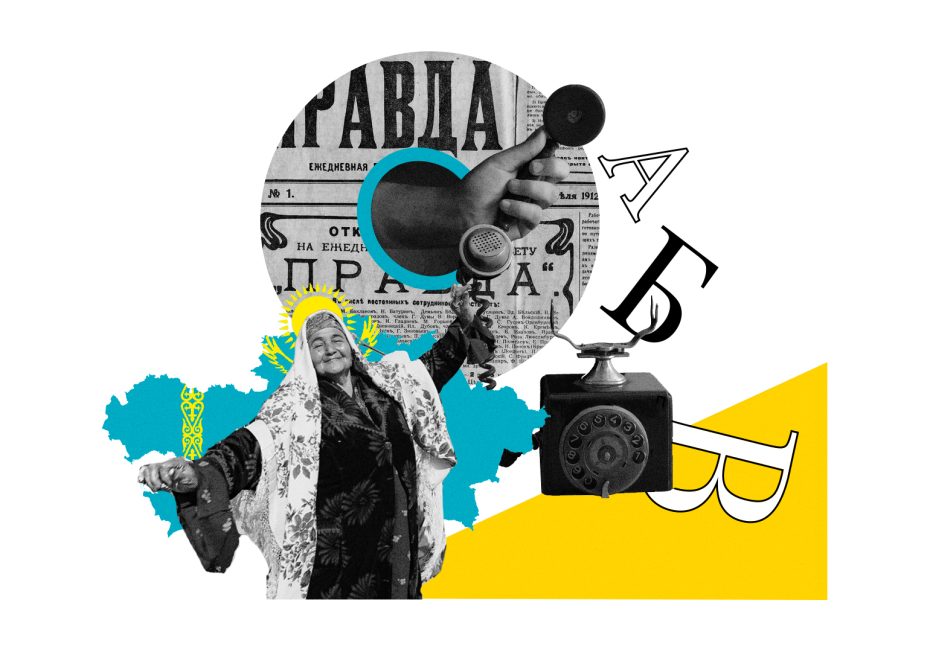On November 8, Kazakhstan’s government put forward legislation that will turn ta firm knowledge of Kazakh and the country’s history and legislation as a requirement for obtaining Kazakh citizenship. The promotion of the use of Kazakh in everyday life has been a hot topic for decades, especially so in recent months when thousands of Russians moved to the country. The Russian language is more widely used in large cities than Kazakh and high-quality content is mostly available in Russian too. Amid the Russian influx in Kazakhstan, this has garnered fears that the Kazakh language might be under threat.
The change in the language requirement to obtain citizenship is not the first attempt to indirectly reduce the influence of the Russian language in the country. At the end of January 2021, the Kazakh government announced plans to transition the country’s written language from Cyrillic to a Latin-based alphabet after almost two decades of delays. The transition is set to take place until 2025 and will be the third time that the country has changed the alphabet over the past century.
While the change is evidence that there is a slow but steady decline of Russian influence in the country, both linguistic and political, has been shifting into its final phase, the diverse ethnic make-up of the country – which has a substantial ethnic Russian population – means the process is likely to be met with a great deal of hostility. Kazakhstan possesses a large community of Russians – around 25 per cent of the country’s 18.75 million people – and Russian is spoken by more than 90 per cent of the population.
In the immediate aftermath of independence, Kazakh replaced Russian as the primary language of education, and Kazakh-language films and television programmes related to the country’s nomadic culture and traditions were widely promoted. Despite this, only 66 per cent of the population are thought to be fluent speakers of Kazakh.
The government now wants to put Russian on the same level as English, a foreign language, but still an important one, part of what it calls a trilingual education system aimed at “increasing the competitiveness of Kazakhs in the world arena”. But it has been hesitant in implementing its plans, fearing the alienation of Kazakhstan’s Russian population, and a possible backlash.
Kazakhstan neighbours Russia and maintains extensive ties with the country and many ethnic Russians and Russian-speaking Kazakhs live in the bordering regions. The Kazakh government first proposed changing its alphabet two decades ago when its demographic balance began to shift following the departure of many ethnic Russians. The number of ethnic Russians in Kazakhstan declined from about 40 per cent at the beginning of the 1990s to today’s 25 per cent.
These demographic changes opened the door for then-Kazakh President Nursultan Nazarbayev to in October 2006 announced the government’s first plans to adopt the Latin alphabet. While these proposals came to nothing, the issue never quite disappeared from the government’s agenda, and the adoption of a Latin-based alphabet was included in the country’s Kazakhstan 2050 development strategy. It was not until 2017 however that Nazarbayev eventually signed a decree designed to implement the change.
Kazakhstan is situated in a strategically important location in Central Asia and politics has always played a role in the history of its language. In 1924, the inherent Arabic script, which had itself replaced early runes, gave way to a Latin-based script – the Soviet Union’s early communist leaders initially supported the use of any alphabet considered secular while Arabic was not. In 1940 however, fearful of pan-Turkic sentiment among Kazakhs, Uzbeks and other Turkic peoples in the Soviet Union, the Latin alphabet was replaced by Cyrillic. This move was largely seen as part of a wider Russification policy as Moscow tried to develop a shared, Soviet sense of common identity.
To date, both Kazakh authorities and Kazakh people have long been in favour of the Latin alphabet, perceiving Cyrillic as “part of Russia’s colonial project”. The adoption of the Latin script as well as imposing a good level of command of Kazakh can therefore be viewed as a natural reaction to this, reflecting the country’s willingness to drift away from Russian influence.
Kazakhstan’s current president, Qassym-Jomart Tokayev, has gone so far as to call the transition an important stage of Kazakhstan’s “spiritual modernisation”. It is also clear that the adoption of the Latin alphabet and the promotion of the Kazakh language over Russian is aimed at enhancing Kazakhstan’s international brand and identity.










